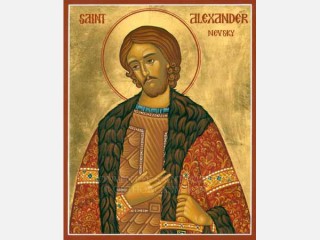
Alexander Nevsky biography
Date of birth : 1219-05-30
Date of death : 1263-11-14
Birthplace : Pereslavl-Zalessky, Vladimir-Suzdal (now Russia)
Nationality : Russian
Category : Historian personalities
Last modified : 2010-11-19
Credited as : Saint of the Russian Orthodox Church, Prince of Novgorod and and Vladimir,
The Russian leader Alexander Nevsky (1219-1263) was prince of Novgorod and then grand prince of Vladimir. An outstanding military leader and statesman, he earned his surname from a victory over the Swedes at the Neva River.
Alexander Nevsky was the son of laroslav Vsevolodovich, Prince of Pereiaslavl and Novgorod. When his father moved to Kiev in 1236, Alexander succeeded him as prince of Novgorod. In 1237 Mongols began to invade Russia from the east, while in the west the Swedes and the Germanic Sword Knights of Livonia pressed against Novgorod under the pretense of a crusade.
His father, who had become grand prince of Vladimir, entrusted Alexander with the defense of the western frontiers. Although greatly outnumbered, Alexander decisively defeated the Swedes on July 15, 1240, at the mouth of the Neva River. Because of a conflict with Novgorod nobility, he had to leave the city shortly afterward but was recalled when the Sword Knights attacked the land. He trapped them on the ice of Lake Peipus on April 5, 1242, and destroyed most of their force.
Seeing the impossibility of waging a successful war with the Mongols, in 1242 laroslav recognized their sovereignty over Russia and pledged his allegiance to the Mongol Khan. When laroslav died in 1246, Alexander succeeded him in Kiev, and Alexander's brother Adrei ascended the throne of Vladimir. In 1252, when Adrei refused to pledge allegiance to the new great Khan, he was driven out of Russia, and the title of grand prince of Vladimir was passed to Alexander.
In spite of strong opposition among the Russian people, Alexander remained faithful to his father's policy of cooperation with the Mongols. He had the full support of the Russian Orthodox Church, which enjoyed considerable freedom and influence under the Mongols. Slowly, he won the people too, for in return for his cooperation Alexander received major concessions from the Mongol khans. Most importantly, they agreed to reduce, and later abandon, their demands for Russian troops and to withdraw their tax collectors from Russian lands.
Alexander died in 1263. His people greatly admired him for his incessant efforts to alleviate the Mongol yoke, his heroic defense of Russia and Orthodoxy in the west, and his deeply felt Christianity. After his death, Alexander came to be venerated as one of the most popular rulers in Russian history, a savior of Russia, and a saint. Bowing to popular pressure, the Russian Church canonized him locally in Vladimir in 1380 and generally in 1547.
A popular sketch of Alexander's life is in Constantin de Grunwald, Saints of Russia (trans. 1960). He has also received considerable attention in two works on Russia: Vasilii O. Kliuchevskii, A History of Russia, vol. 1 (trans. 1911), and George Vernadsky, A History of Russia, vol. 3 (1953).
















